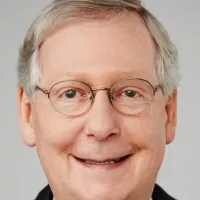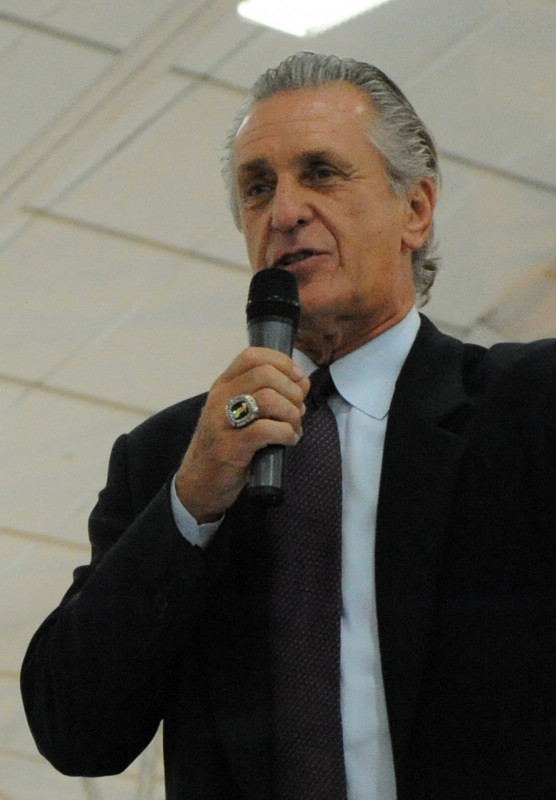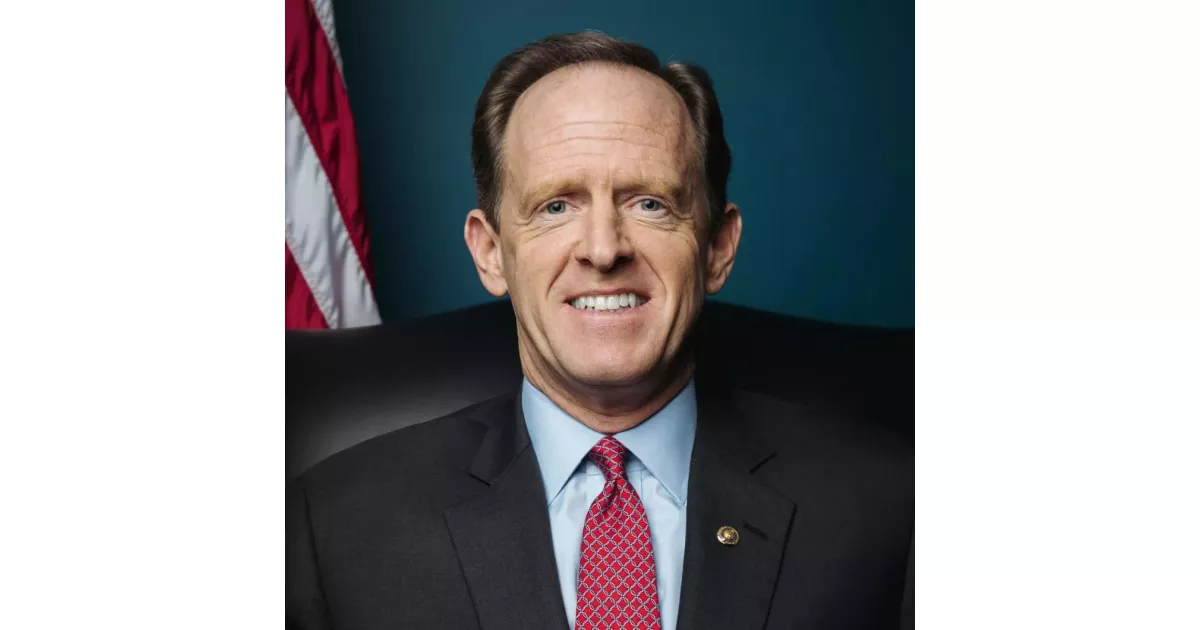"Patrick Joseph Toomey Jr. is a retired American politician and businessman who served as a U.S. Senator from Pennsylvania from 2011 to 2023. He is a member of the Republican Party. Before his time in the Senate, he represented Pennsylvania's 15th congressional district in the U.S. House of Representatives for three terms, from 1999 to 2005."
November 17, 1961: Birth of Pat Toomey
Pat Toomey was born on November 17, 1961. He would go on to become an American businessman and politician, serving as a United States senator from Pennsylvania from 2011 to 2023.
1984: Graduated from Harvard College
In 1984, Pat Toomey graduated from Harvard College with a B.A. in government.
1986: Joined Morgan, Grenfell & Co.
In 1986, Pat Toomey was hired by Morgan, Grenfell & Co., where he dealt in multiple foreign currencies, interest rates, and currency-related derivatives.
1991: Resigned from Morgan, Grenfell
In 1991, Pat Toomey resigned from Morgan, Grenfell after it was acquired by Deutsche Bank. He then opened Rookie's Restaurant in Allentown, Pennsylvania with his two younger brothers.
1994: Elected to Government Study Commission
In 1994, Pat Toomey was elected to Allentown's newly established Government Study Commission.
April 23, 1996: Allentown Charter Approved
On April 23, 1996, the new charter for Allentown, which Pat Toomey helped draft as part of the Government Study Commission, was approved by voters.
November 1997: Toomey Marries Kris Ann Duncan
Pat Toomey married Kris Ann Duncan in November 1997. The couple has three children.
1998: Stance on Legal Abortion in First Trimester
During his initial congressional campaign in 1998, Toomey stated his belief that abortion should be legal only during the first trimester of pregnancy.
1998: Ran for Congressional Seat
In 1998, Pat Toomey ran for Pennsylvania's 15th congressional district and won the six-candidate Republican primary with 27% of the vote.
January 1999: Named to House Budget Committee
In January 1999, Pat Toomey was named to the House Budget Committee.
1999: Role in Repealing Parts of the Glass-Steagall Act
As a member of the House Banking Committee, Toomey contributed to writing House Resolution 10 in 1999, leading to the partial repeal of the Glass-Steagall Act, which had separated commercial and investment banking.
1999: Began Congressional Term
In 1999, Pat Toomey started his service as the U.S. representative for Pennsylvania's 15th congressional district, a role he held until 2005.
1999: Advocacy for Financial Services Deregulation
In 1999, Toomey attributed the sustained economic expansion to deregulation, advocating for continued deregulation, particularly within the financial services industry.
2000: Opposition to the Kyoto Protocol
In 2000, Toomey opposed implementing the Kyoto Protocol, an international agreement aimed at reducing greenhouse gas emissions.
2000: Support for Derivatives Market Deregulation
Leveraging his professional experience, Toomey championed the deregulation of the derivatives market in 2000, pushing for the Commodity Futures Modernization Act, which he believed would reduce regulatory uncertainty in the field.
2001: Proposed Budget Cuts
In 2001, Pat Toomey proposed a budget that would cut taxes by $2.2 trillion over ten years, exceeding President Bush's $1.6 trillion plan.
2001: Vote Against Fuel Efficiency Standards
Toomey voted against raising corporate average fuel economy (CAFE) standards and providing incentives for alternative fuels in 2001, hindering efforts to reduce dependence on fossil fuels.
2002: Voted for Iraq Resolution
In 2002, Pat Toomey voted in favor of the Iraq Resolution, which authorized military action against Iraq.
2003: Support for the Healthy Forests Initiative
In 2003, Toomey supported the Healthy Forests Initiative, a controversial measure that aimed to prevent wildfires by permitting timber harvesting in protected forests.
2004: Challenged Senator Arlen Specter
In 2004, Pat Toomey challenged longtime incumbent Senator Arlen Specter in the Republican primary election. Although aided by $2 million in advertising from the Club for Growth, he lost by a narrow margin of 1.6 percentage points.
2004: Lost Senate Primary
In 2004, Pat Toomey narrowly lost the Republican primary for United States Senate.
2004: Support for Traditional Marriage Definition and Constitutional Amendment Banning Same-Sex Marriage
Toomey stated his belief in 2004 that only couples fitting the "traditional" definition of marriage (one man, one woman) should receive special benefits and voted for a constitutional amendment banning same-sex marriage.
2005: Became Club for Growth President
In 2005, Pat Toomey began serving as president of the Club for Growth, a position he held until 2009.
2005: End of Congressional Term
Pat Toomey's service as the U.S. representative for Pennsylvania's 15th congressional district concluded in 2005.
April 15, 2009: Announced Senate Candidacy
On April 15, 2009, Pat Toomey announced his intention to challenge Arlen Specter again in the 2010 Republican primary.
April 28, 2009: Specter Switched Parties
On April 28, 2009, Arlen Specter announced he would switch parties and run as a Democrat after polls showed him losing to Pat Toomey in the primary.
2009: Left Club for Growth
Pat Toomey's term as president of the Club for Growth ended in 2009.
2009: Opposition to Federal Stimulus Package and Government Intervention in Healthcare and Agriculture
Toomey expressed his opposition to the 2009 federal stimulus package. He consistently advocates against government-run or subsidized healthcare systems, and also opposes farm subsidies.
May 18, 2010: Primary Elections Held
On May 18, 2010, both the Republican and Democratic primaries for the U.S. Senate election in Pennsylvania were held, with Pat Toomey emerging as the Republican nominee.
November 2, 2010: Elected to Senate
Pat Toomey was elected to the United States Senate on November 2, 2010.
2010: Support for Repeal of Don't Ask, Don't Tell
As Senator-elect in 2010, Toomey voiced his support for the repeal of "Don't ask, don't tell," the policy preventing openly gay and bisexual individuals from serving in the military.
2010: Won Senate Election
In 2010, Pat Toomey won the Republican primary for the U.S. Senate election in Pennsylvania and subsequently defeated the Democratic nominee, Joe Sestak, in the general election.
2010: Claim of Ceasing Earmarks
In 2010, during his Senate campaign, Toomey asserted that he had stopped requesting earmarks as a congressman. However, he did not provide any evidence to support this claim, despite having signed the "No Pork" pledge.
2010: Questioning Climate Change Consensus
Pat Toomey expressed doubts about the scientific consensus on human-caused climate change in 2010, acknowledging climate change's occurrence but questioning the extent of human impact.
2010: Support for Abortion Ban and Penalties for Doctors
While campaigning for Senate in 2010, Toomey expressed support for legislation to ban abortions and impose jail sentences on doctors who perform them.
2010: Opposition to Gun Control Executive Orders and Support from Gun Rights Groups
While opposing President Obama's executive orders on gun control as exceeding constitutional authority, Toomey supported congressional action on background checks and received substantial campaign contributions from gun rights groups, including the NRA, which endorsed him in 2010.
January 3, 2011: Began Senate Term
Pat Toomey's term as a United States senator officially began on January 3, 2011.
August 11, 2011: Appointed to Deficit Reduction Committee
On August 11, 2011, Senate minority leader Mitch McConnell named Pat Toomey to the United States Congress Joint Select Committee on Deficit Reduction.
December 2011: Introduction of Earmark Elimination Act
In December 2011, Toomey, alongside Senator Claire McCaskill, brought forward the Earmark Elimination Act of 2011. This bill, which aimed to eliminate earmarks, ultimately failed to pass. It was reintroduced in 2014 but was once again unsuccessful.
2011: Began Senate Term
In 2011, Pat Toomey began his term as a United States senator from Pennsylvania, a position he would hold until 2023.
2011: Sponsorship of Balanced Budget Amendment and Support for Unemployment Benefits with Spending Offsets
In 2011, Toomey took the lead in sponsoring a federal balanced budget amendment. He also showed support for extending unemployment benefits, proposing that the associated costs be offset by reducing government spending in other areas.
2011: Limiting EPA's Regulatory Authority
Toomey voted in 2011 to restrict the Environmental Protection Agency's (EPA) ability to regulate greenhouse gas emissions, a move counter to addressing climate change.
March 2012: Leading Sponsor of the JOBS Act
Toomey emerged as a key supporter of the JOBS Act, passed in March 2012, which aimed to ease regulations on emerging growth companies and facilitate capital raising for startups.
April 26, 2012: Chairman of Senate Steering Committee
On April 26, 2012, Pat Toomey was selected to chair the United States Senate Steering Committee.
2012: Opposition to Medicare Prescription Drug Act and Proposed Budget Cuts
In 2012, Toomey opposed the Medicare Prescription Drug Act, deeming it fiscally irresponsible. He also put forward a budget proposal that included significant cuts to Medicaid, aiming to transition it into a block grant program for states and slash federal funding by 50% by 2021. These proposed cuts were even more substantial than those suggested by Paul Ryan.
November 2013: Proposed Amendment to Exempt Religious Entities from Employment Non-Discrimination Act
Toomey put forth an amendment in November 2013 seeking to exempt private religious entities from adhering to the Employment Non-Discrimination Act, but the amendment failed. Despite this, he ultimately voted in favor of the bill.
2013: Introduction of Background Check Legislation
Following the Sandy Hook Elementary School shooting, Toomey collaborated with Senator Joe Manchin in 2013 to introduce legislation mandating background checks for most gun sales, though the bill repeatedly failed.
2013: Opposition to Carbon Tax
In 2013, Toomey voted against a carbon tax or fee on carbon emissions, further demonstrating his stance against policies aimed at mitigating climate change.
2013: Support for Violence Against Women Act Reauthorization
In 2013, Toomey voted in favor of reauthorizing the Violence Against Women Act.
2013: Vote Against Reopening the Government
Toomey was among 18 senators who voted against reopening the government during the 2013 United States government shutdown, citing concerns about increasing national debt without fiscal reforms.
2014: Protecting the Allegheny National Forest
Toomey advocated for protecting the Allegheny National Forest in 2014, emphasizing responsible management of existing lands over further acquisition.
2014: null
null
January 21, 2015: Conflicting Votes on Climate Change Amendments
During a debate on the Keystone pipeline on January 21, 2015, Toomey exhibited inconsistent voting, opposing a climate change amendment by Brian Schatz while supporting a similar one by John Hoeven.
March 2015: Support for Paid Sick Leave Amendment
Toomey voted in favor of an amendment in March 2015 that aimed to create a deficit-neutral reserve fund. This fund would allow employees to accrue paid sick time.
2015: Vote Against the Clean Power Plan
Continuing his trend of opposing climate change initiatives, Toomey voted against the Clean Power Plan in 2015, a policy designed to reduce carbon emissions from power plants.
2015: Disagreement with Supreme Court Decision on Same-Sex Marriage
Following the Supreme Court's ruling legalizing same-sex marriage, Toomey expressed his disagreement with the decision in 2015.
2015: Reintroduction of Background Check Legislation
Toomey and Manchin reintroduced their background check legislation in 2015, but it faced continued opposition and failed to pass.
June 2016: Vote Against No-Fly List Gun Ban
Toomey opposed a bill in June 2016 to prohibit gun purchases by individuals on the no-fly list, citing concerns about due process for those wrongly listed. Despite various efforts, no compromise was reached on gun control legislation until after the Robb Elementary School Shooting when Toomey worked with a bipartisan group of senators to craft a deal that included a red flag provision, support for state crisis intervention orders, funding for school safety resources, stronger background checks for buyers under the age of 21, and penalties for straw purchases. This deal eventually led to the Bipartisan Safer Communities Act, which Toomey voted for.
September 2016: Advocacy for US Action Against Russian Airstrikes in Syria
In September 2016, Toomey was one of 34 senators who signed a letter addressed to Secretary of State John Kerry. The letter urged the U.S. to take decisive action in deterring Russia from conducting further airstrikes in Syria, particularly those originating from an Iranian airbase near Hamadan. The senators argued that these airstrikes were detrimental to US interests and violated a legally binding UN Security Council resolution on Iran.
2016: Reelection to Senate
In 2016, Pat Toomey was reelected to the Senate, defeating Democratic nominee Katie McGinty.
2016: Downgraded Rating from the NRA
Toomey's advocacy for background check legislation resulted in a significant downgrade of his rating from the NRA from an "A" to a "C" ("poor") in 2016.
November 2017: Co-Sponsorship of Israel Anti-Boycott Act
Toomey co-sponsored the Israel Anti-Boycott Act (s. 720) in November 2017. This controversial bill sought to criminalize American citizens' involvement in boycotts against Israel, including Israeli settlements in the occupied West Bank, if those boycotts were motivated by protests against Israeli government actions.
2017: Opposition to Obamacare and Role in Repeal Efforts
During 2017, amidst Republican attempts to dismantle the Affordable Care Act (Obamacare), Toomey made claims that the independent insurance market was caught in a "death spiral" due to the ACA's implementation. He actively participated in crafting the Republican bill aimed at repealing Obamacare.
2017: Support for Betsy DeVos and Charter Schools
In 2017, Pat Toomey supported increased spending on charter schools and backed Betsy DeVos as Secretary of Education, despite her family's significant contributions to his campaigns, which sparked protests and public outcry.
2017: Opposition to Arctic Drilling Restrictions
In line with his pro-fossil fuel stance, Toomey opposed restrictions on oil drilling and development in the Arctic National Wildlife Refuge in 2017.
2017: Support for Travel Ban on Citizens from Muslim-Majority Countries
Toomey expressed his support for President Trump's 2017 executive order that banned entry to the U.S. for citizens from seven Muslim-majority countries.
January 2018: Toomey Supports Modernizing NAFTA
In January 2018, Toomey and 35 other Republican senators signed a letter to President Trump advocating for the modernization of the North American Free Trade Agreement (NAFTA) to better suit the 21st-century economy.
February 2018: Support for Discussing Impeachment of Pennsylvania Supreme Court Justices
In February 2018, Toomey suggested that it was worthwhile to discuss impeaching justices on the Pennsylvania Supreme Court. This came after their ruling that a gerrymandered congressional map violated the state's constitution.
March 2018: Vote Against Resolution to End US Involvement in Yemen War
In March 2018, the Senate voted on a resolution that called for the withdrawal of US troops from Yemen within 30 days. This resolution, spearheaded by Senators Bernie Sanders, Chris Murphy, and Mike Lee, allowed for exceptions if those troops were engaged in direct combat against Al-Qaeda. Toomey voted against the resolution.
April 2018: Toomey expresses concern over North Korean Sanctions Evasion
In April 2018, Toomey joined seven other Republican senators in expressing concern to the Trump administration about reports of North Korea evading sanctions with help from Russia and China. They called for a swift response to the use of chemical weapons by Syrian President Bashar al-Assad and his forces.
September 2018: Opposition to Government Spending Bill
In September 2018, a $854 billion spending bill was proposed to prevent a government shutdown. The bill included funding for crucial departments like Defense, Health and Human Services, Labor, and Education. However, Toomey was one of six Republican senators who voted against it.
October 6, 2018: Voted to Confirm Brett Kavanaugh
On October 6, 2018, Pat Toomey was one of 50 senators to vote to confirm Brett Kavanaugh to the Supreme Court.
November 2018: Toomey Urges Swift Passage of USMCA
In November 2018, Toomey joined 11 other Republican senators to urge President Trump to send the United States-Mexico-Canada Agreement (USMCA) to Congress before the end of the month. They expressed concern that the agreement's passage would become more difficult with the incoming 116th Congress.
February 2019: Voted Against Shutdown Legislation
In February 2019, Pat Toomey was one of 16 senators to vote against legislation preventing a partial government shutdown and containing $1.375 billion for barriers along the U.S.-Mexico border.
February 2019: Opposition to Border Wall Funding and Government Shutdown Prevention
In February 2019, Toomey was among 16 senators who opposed legislation aimed at averting a partial government shutdown. This legislation included $1.375 billion in funding for barriers along the U.S.-Mexico border, encompassing 55 miles of fencing.
March 2019: Cosponsored Supreme Court Resolution
In March 2019, Pat Toomey was one of 12 Republican senators to cosponsor a resolution proposing a constitutional amendment to limit the Supreme Court to nine justices.
March 2019: Opposition to Trump's National Emergency Declaration for Border Wall Funding
March 2019 saw Toomey join 11 other Republican senators in voting to block President Trump's declaration of a national emergency. This declaration would have granted Trump access to $3.6 billion from military construction funds for building border barriers.
August 2019: Opposition to Trump's Impeachment and Calling for Swift Resolution
In August 2019, according to a New York Times report, former National Security Advisor John Bolton claimed in his upcoming book that Trump had expressed his desire to withhold aid to Ukraine. This pressure tactic was allegedly intended to coerce Ukrainian officials into assisting with investigations into Democrats, including Joe Biden and his son. Despite this revelation, Toomey maintained his stance that Trump's actions, even if confirmed by Bolton's testimony, did not warrant impeachment. He advocated for a swift resolution to the impeachment proceedings, stating, "We should move as quickly as we can to get this thing over with, get this behind us." Ultimately, Toomey joined his Republican colleagues in voting against convicting Trump on both articles of impeachment.
December 2019: Opposition to Trump's Impeachment Inquiry and Criticism of House Democrats
In December 2019, following allegations that President Trump had attempted to extort Ukrainian President Volodymyr Zelenskyy, Toomey dismissed the notion of impeachment. He questioned the existence of a crime and accused House Democrats of breaking with bipartisan precedent in their pursuit of an impeachment inquiry. This was despite Toomey's earlier acknowledgment of Trump's actions as "errors of judgment." Trump's alleged attempt involved pressuring Zelenskyy to fabricate investigations into his political rival, Joe Biden.
2019: Strong Support for Banking Deregulation
Toomey consistently advocated for banking deregulation, with The Washington Post reporting in 2019 that a majority of his top campaign contributors were financial company officials.
January 2020: Support for Overturning Roe v. Wade
In January 2020, Toomey joined an amicus brief to the US Supreme Court, urging the overturn of several rulings protecting abortion rights, including the landmark Roe v. Wade decision.
April 17, 2020: Appointed to COVID-19 Oversight Commission
On April 17, 2020, Pat Toomey was appointed by Senate Majority Leader Mitch McConnell to the COVID-19 Congressional Oversight Commission to oversee the implementation of the CARES Act.
July 2020: Condemnation of Trump's Commutation of Roger Stone's Sentence
In July 2020, Toomey joined Senator Mitt Romney in criticizing President Trump's decision to commute Roger Stone's sentence. While acknowledging Trump's legal authority to grant clemency, Toomey considered the commutation a "mistake" due to the seriousness of the charges against Stone. He also pointed out the contradiction with Attorney General Bill Barr's stance, who deemed Stone's prosecution and sentence as "righteous," "appropriate," and "fair," respectively.
October 4, 2020: Reported Retirement
On October 4, 2020, it was reported that Pat Toomey would retire at the conclusion of his term, forgoing a reelection campaign or a run for governor in 2022.
October 5, 2020: Announced No Reelection Bid
On October 5, 2020, Pat Toomey announced that he would not run for reelection to a third Senate term in 2022.
January 9, 2021: Acknowledgment of Trump's Impeachable Offense but Uncertainty on Conviction Vote
Following the January 6th attack on the U.S. Capitol, Toomey conceded that President Trump's actions likely constituted an impeachable offense. However, he refrained from stating whether he would vote to convict Trump in the Senate trial.
February 13, 2021: Voted to Convict Trump
On February 13, 2021, Pat Toomey was one of seven Republican senators who voted to convict Donald Trump of incitement of insurrection in his second impeachment trial.
May 28, 2021: Toomey Abstains from Voting on January 6th Commission
On May 28, 2021, Toomey abstained from a vote on establishing an independent commission to investigate the attack on the United States Capitol that took place on January 6th.
July 2021: Doubts on Global Warming Data
In July 2021, Toomey downplayed the significance of global warming data, claiming it lacks sufficient clarity to warrant new regulations impacting consumers.
2021: Low Environmental Scorecard Rating
Reflecting his environmental voting record, the League of Conservation Voters (LCV) awarded Toomey a dismal 18% score on their 2021 National Environmental Scorecard, with a lifetime score of 7%.
2021: null
null
August 7, 2022: Vote Against Capping Insulin Costs
On August 7, 2022, the Senate voted on an amendment that would have capped the cost of insulin at $35 per month. Toomey was one of 43 senators who voted against the amendment, which ultimately failed.
2022: Support for Gun Control Measures While Upholding Second Amendment Rights
In a 2022 interview, Toomey expressed that Republicans can support gun control measures like background checks, state red flag laws (with due process considerations), school safety enhancements, and mental health initiatives without compromising their stance on Second Amendment rights.
2022: End of Senate Term
Pat Toomey's term as a United States senator concluded in 2022, as he decided not to seek reelection.
2023: Toomey Joins Apollo Global Management Board
After leaving the Senate in 2023, Toomey joined the board of Apollo Global Management.
2023: End of Senate Term
Pat Toomey's tenure as a United States senator from Pennsylvania ended in 2023.
Mentioned in this timeline

Donald John Trump is an American politician media personality and...

Bernie Sanders is a prominent American politician currently serving as...
Ukraine is a country in Eastern Europe the second-largest on...

Joe Biden is an American politician who served as the...
The Affordable Care Act ACA also known as Obamacare is...

Addison Mitchell McConnell III is an American politician and attorney...
Trending

18 minutes ago Sebastian Korda Dominates Tommy Paul to Win Delray Beach Open Trophy.

18 minutes ago Kyle Larson crashes in Atlanta race after SVG contact; Wallace wins stage.

18 minutes ago Adam Scott eyes third Riviera title at Genesis Invitational after impressive round.
1 hour ago Zimbabwe launches HIV prevention drug Lenacapavir; Kenya to roll out HIV shots.

1 hour ago Tami Roman Shines in 'Double Double Trouble' Premiere on Lifetime Channel

1 hour ago Pat Riley Honored with Statue Outside Lakers' Arena, Cementing Legacy.
Popular

Jesse Jackson is an American civil rights activist politician and...

Barack Obama the th U S President - was the...

Bernie Sanders is a prominent American politician currently serving as...

Michael Joseph Jackson the King of Pop was a highly...
The Winter Olympic Games a major international multi-sport event held...
WWE Raw a professional wrestling television program by WWE airs...
